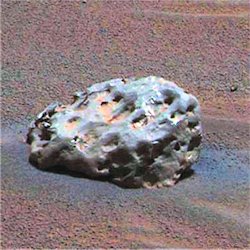
|
Some Common Myths Thought to be True - Myth 35
Myth 35: Meteorites are Hot when Striking Earth Meteorites are not necessarily hot when they reach the Earth. In fact, many meteorites are found with frost on them. As they enter the atmosphere, having been warmed only by the sun, meteors have a temperature below freezing. The intense heat produced during passage through the upper atmosphere at very high speed then melts a meteor's outside layer, but molten material is blown off and the interior does not have time to warm appreciably. Most meteorites fall through the relatively cool lower atmosphere for as long as several minutes at subsonic velocity before reaching the ground, giving plenty of time for their exterior to cool off again. |
| Meteorite | |
|
A meteorite is a portion of a meteoroid or asteroid that survives its passage
through the atmosphere and hits the ground without being destroyed. Meteorites
are sometimes, but not always, found in association with hypervelocity impact
craters; during energetic collisions, the entire impactor may be vaporized,
leaving no meteorites. Geologists use the term, "bolide," in a different sense
from astronomers to indicate a very large impactor. For example, the USGS uses
the term to mean a generic large crater-forming projectile in a manner "to
imply that we do not know the precise nature of the impacting body ... whether
it is a rocky or metallic asteroid, or an icy comet for example." Meteoroids
also hit other bodies in the solar system. On such stony bodies as the moon or
Mars with no or little atmosphere, they leave enduring craters.
|
|
| ⇦ Back to Myth 34 Return to Myth Choices Page 3 On to Myth 36 ⇨ | |